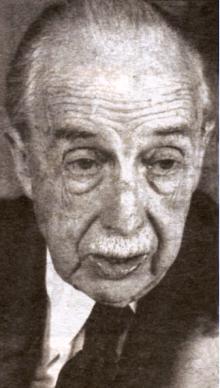José María Aguirre Gonzalo facts for kids
Quick facts for kids
José María Aguirre Gonzalo
|
|
|---|---|
 |
|
| Born | 12 August 1897 San Sebastián, Spain
|
| Died | 7 April 1988 (aged 90) Madrid, Spain
|
| Nationality | Spanish |
| Occupation | Civil engineer, businessman |
José María Aguirre Gonzalo (born August 12, 1897 – died April 7, 1988) was an important Spanish engineer, businessman, and banker from the Basque Country. He played a big part in helping Spain's economy grow after the Spanish Civil War (1936–1939). This was during the time when Francisco Franco was in charge of the country.
Contents
Early Life and Education (1897–1927)
José María Aguirre Gonzalo was born in San Sebastián, Spain, on August 12, 1897. He went to the Higher Technical School in Madrid to study Civil Engineering. He finished his studies and graduated in 1921. Later, he even taught classes there about accounting and how businesses are organized. He also took some law courses.
After graduating, he started working on the Madrid Metro project with the Otamendi brothers. The Madrid Metro is a subway system. By 1919, almost 4 kilometers (about 2.5 miles) of the subway line were already open.
Starting a Business (1927–1939)
In 1927, Aguirre and his friend Alejandro San Román started their own construction company called Agromán. Aguirre was the chairman and managing director of this company. Later, he became its honorary chairman.
In its first few years, Agromán won big contracts to build public works and buildings. Public works are things like roads, bridges, and government buildings that are built for everyone to use. In the 1930s, Agromán worked on important projects. These included the University City of Madrid, which is a large area with many university buildings, and a railway link called the Castellana rail link.
In 1934, some important people, including Manuel Sánchez Arcas and Eduardo Torroja, started the Instituto Técnico de la Construcción y Edificación (ITCE). This was a Technical Institute of Construction and Building. Aguirre Gonzalo was also one of the founding members. The ITCE was a non-profit group. This means it didn't aim to make money. Its goal was to create and use new technical ideas in building civil structures like bridges and buildings.
During a time in Spain called the Second Spanish Republic, Aguirre had some problems with the government. He was held in prison for a short time.
Building Spain's Economy (1939–1988)
After the Spanish Civil War ended in 1939, Agromán became one of the top construction companies in Spain, along with another company called Dragados. Aguirre played a very important role in helping Spain's economy grow. He started or helped grow many big companies in different business areas.
He advised the Renfe railway company and the Compañía Sevillana de Electricidad, which was an electricity company. He was also the president of several companies, including:
- Ribagorzana hydroelectric company (which makes electricity from water)
- Acerinox steel company
- Siemens España engineering company
He was also a director and owned shares in two newspapers, El Diario Vasco and Informaciones. He became the president or a board member of more than fifty companies. This made him one of the most well-known and powerful businessmen of his time.
In Politics
From 1961 to 1976, Aguirre was a procurador in Francisco Franco's Cortes. The Cortes was like Spain's parliament at the time. He first represented the Association of Civil Engineers. Later, Franco himself directly appointed him to the position.
Aguirre said he didn't want to be a politician, even though he had a seat in parliament. He even turned down an offer from Franco to become the Minister of Housing. He led the transport committee for Spain's plan to develop its economy and society. He was also a member of the national economic council. In the 1970s, Franco made him vice-president of an important group called the Fundamental Laws commission.
Aguirre was also part of several international groups. These included the European Concrete Committee and the Spanish committee of the World Energy Council. He was also a member of the European Cultural Foundation.
In Banking
Aguirre started working in banking in 1941. In 1956, he became the chairman of the Banco Guipuzcoano. He stayed in this job until he passed away in April 1988. After his death, his son, who was also named José María Aguirre González, took over his position.
He was also the chairman of the Banco de Desarrollo Económico y Social (Bank of Economic and Social Development). He was a director and then vice-president of the Banco Español de Crédito (Banesto). He became the chairman of Banesto in September 1970. Soon after becoming chairman, he started weekly lunch meetings with the leaders of the seven biggest banks. Important people from the government's money-managing groups were also invited.
By the 1980s, the main banks in Spain needed more money. Aguirre believed that banks should specialize in certain areas. He did not agree with combining banks through mergers or buying other banks. He left Banesto in 1983.
Aguirre helped create the Colegio de Ingenieros de Caminos (College of Civil Engineers). He was the first president of this college. He also helped create the Colegio Universitario de Estudios Financieros (University College of Financial Studies), known as CUNEF.
José María Aguirre Gonzalo died from a heart attack on April 7, 1988, in Madrid. He was 90 years old.
Sources
See also
 In Spanish: José María Aguirre Gonzalo para niños
In Spanish: José María Aguirre Gonzalo para niños

